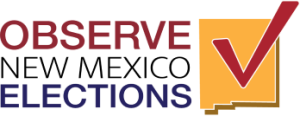Poll Worker Training
What Is It?
Before every election, counties hold trainings for poll workers — the community members who run polling places during Early Voting and Election Day. Poll workers play an important role in ensuring that eligible voters can cast their votes during elections. During elections, their duties include “setting up the voting equipment, opening and closing polling locations, checking in voters, verifying IDs, answering voters’ questions, ensuring election rules are followed, and making sure that every ballot is submitted and secured.” Poll workers in the state of New Mexico must be registered to vote, be residents of the county where they serve as poll workers, and undergo training in order to work.
During the Poll Worker Training, prospective poll workers learn about the following:
- Opening, closing and securing the polling place
- Setting up and maintaining voting machines and materials
- Operating election equipment
- Standard voting procedures, including:
- Checking in voters and providing assistance
- Provisional ballots
- Accommodations for different voters
- Same day voter registration
- Enforcing election rules and preventing intimidation

What Are we Observing/Looking For?
When ONME observes Poll Worker training, we look for the following:
● The accessibility of the training
● Training content
● Training environment
The Accessibility of Training
It is important that Poll Worker Training is accessible to all who are eligible to become poll workers and wish to partake. This includes posting proper signage to know where the testing site is and ensuring that testing sites are accessible to people with physical disabilities. An accessible testing site should offer wheelchair accessible entrances that are unlocked and provide disabled parking spots. Although the presence or absence of these kinds of accommodations may not determine whether a Poll Worker Training is compliant with the Americans with Disabilities Act (ADA), at ONME, we believe that ensuring accessibility is a crucial part of ensuring the electoral process is accessible to all – whether they have a disability or not.
Training Content
ONME is interested in what type of content is covered in the respective training we observe. Trainings have extensive breadth in content coverage, regardless of whether the audience consists of seasoned and highly experienced poll workers or not. They are critical in ensuring every poll worker who will actually work at a polling station has access to the same information that includes knowing the rules and laws in place to ensure smooth and fair elections and how to protect themselves and the democratic process when things do not go as planned.
Training Environment
As in every aspect of the electoral process we observe, we are always interested in learning about the environment in which a certain electoral process took place. This includes the environment of poll worker training. We are interested in knowing who observed these training (including political party observers, members of the public, the media, and others), and whether any adverse events occurred that may have hindered the process (such as violence, harassment, intimidation, and others). Ensuring that every training environment is free of conflict and violence is crucial to train competent and knowledgeable poll workers that are confident in their work during the election.
Why Is It Important?
When poll workers get good training and understand their jobs, elections run more smoothly and with fewer mistakes. Clear training helps make sure voting rules are followed the same way everywhere in the county and state.
What we found in 2024
What Went Well
- Trainings were positive and professional. Most sessions were well-organized, welcoming, and free of disruptions.
- Key topics were usually covered. Most trainings explained basics like how to process same-day registration, issue ballots, and close polling places.
- Accessible locations. Most training venues were easy to get to and navigate, with only a few reports of crowding or poor visibility.
- No intimidation or harassment. Observers saw respectful environments where trainers and poll workers could focus on learning.
Challenges
- Language access requirements were often skipped. Only about one-third of trainings covered the federal requirement to provide Spanish and Native language ballots in certain counties.
- Some important rules weren’t always explained. Fewer sessions covered how to enforce laws against electioneering and intimidation, or how to handle the presence of police and other law enforcement officers at polling places.
- Uneven coverage across counties. Not every county went through all 40 topics, leaving gaps in preparation.
Contact Us
The mission of Observe New Mexico Elections is to increase transparency and trust in New Mexico’s elections by training and deploying nonpartisan election observers throughout the state. Observers will report on how election laws and procedures are followed, representing all voters without interfering in the electoral process. Findings from their observations will be compiled to assess the overall quality of elections in New Mexico.
